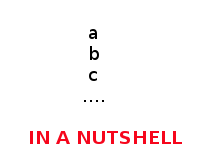 Democracy needs votes to be anonymously collected and recorded
Democracy needs votes to be anonymously collected and recorded
In electronic elections we can use criptography, secret passwords, special networks, Mathematical Voting Systems and any other techniques, but at the end we'll always have a file of anonymous votes which can't be verified because:
- only the voter could verify his own vote, but nobody knows who he is!
- even if we could find a safe way to allow voters to verify the vote stored in their behalf, we couldn't trust their verification! Voters may be under illicit pressure to confirm or deny such vote, they may have changed their mind, or they may wish to mess election up.
- the fact a vote was properly stored doesn't implies it was also properly counted up.
 Democracy needs votes to be collected, stored and tallied up honestly
Democracy needs votes to be collected, stored and tallied up honestly
Since votes (not only electronic votes!) cannot verified against the will of their (unknown) voters, we have to hope they have been collected, stored and tallied up honestly and without any external interference.
During electronic elections we, the people, must relay on the honesty of hardware ands software computer technicians involved in the elections They should verify that electronic electoral procedures have properly worked by the lack of system crash, lack of logged errors and so on. From such supposed absence of errors we, the people, should deduce the correctness of electoral results. But, even if we could trust all the technicians, we know that logs, report, files, everyting on any computers can be modified, hacked and replaced. We also know that such actions are extremely easy for the computers' owners (usually the incumbent governments, or their contractors, which have obvious interests in the election).
In any case the above verification can only be done by some very qualified technical staff. They will probably belong to a private company and they will certify electoral results just as the bosses of ENRON did certify their financial statements until the end. Unfortunately we can't neither relay on the hope that public and civil servants are more honest than private employees.
 VVPAT and PCOS
VVPAT and PCOS
Nor VVPAT nor PCOS are a solution since:
- being the only trusted votes, VVPATs should be printed AND COUNTED for each given vote!
- an "electronic" election with full VVPAT printing and counting doubles the effort of any election: counting of electronic votes and counting of VVPATs.
- PCOS can be hacked
 foreign countries and terroristic groups are interested in attacking our elections
foreign countries and terroristic groups are interested in attacking our elections
Electronic elections are out of any democratic control. Since elections give the power to rule nations and peoples, it must be assumed that elections' attackers are highly motivated, well financed, sophisticated, and could be outsiders as well as insiders with full knowledge of the election system. These attackers could be political operatives, voters, vendor personnel, polling place workers, election administrators, foreign countries, international terroristic organizations, or just pranksters.
 it's easy to set up a dictatorship using e-vote
it's easy to set up a dictatorship using e-vote
Dictatorships are usually set up and preserved by means of violence, but the power can also be taken and preserved using electoral fraud. Whenever such fraud were undetected the electoral results would no more rely on our votes, but we, the people, would not even notice to have lost Democracy since we would continue voting.
 it's easy to preserve a dictatorships using e-vote
it's easy to preserve a dictatorships using e-vote
If your country will ever be ruled by a dictator, in case of electronic election will you trust its results? You will not have any help from International observers: they can help in paper election, but they are useless in e-election.
 In any case democracy deserves the "precautionary principle"
In any case democracy deserves the "precautionary principle"
In any case, since there are so many doubts about e-vote, we should apply the Precautionary Principle to elections as well: we should continue voting using ballot papers as we have succesfully done for the last two centuries.

-
in voting we DO NOT NEED electronic
(we don't need its speed and it doesn't give any reduction of costs) -
in voting we NEED NOT to have electronic
(we need elections to be under the control of the people).



